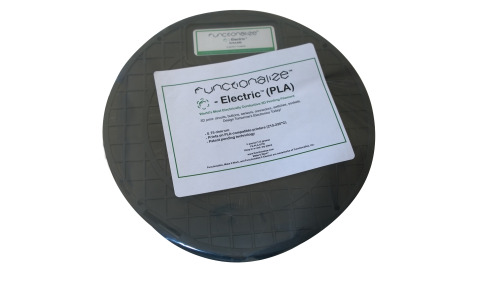
Functionalize has released a “high conductivity” PLA filament that can be used to 3D print electrical traces.
In recent months, there have been several introductions of electrically-conductive filament. Essentially, these are composite filaments, where standard PLA plastic is mixed with something to create a conductive filament.
These filaments can be used to print functional electrical traces, and would be most useful in a dual extruder 3D printer, where you can print both the electrical traces and the object they’re embedded within. For example, you could 3D print an electronics box with space for a PCB and a battery compartment with embedded leads taking power from the batteries to the board. And you can print this all in one operation.
The knock against these conductive filaments is the degree of conductivity, which is important when determining how much current can traverse a 3D printed circuit. The more conductive the filament, the less you need to 3D print.
Functionalize’s new “F-Electric” filament is said to be the “world’s first highly conductive 3D printing filament”, but we’re a bit skeptical as there are several other conductive filament options. Is F-Electric as conductive as the F-Electric product?
Functionalize also offers a kit for 3D printing a flashlight keychain using F-Electric. The kit, which sells for only USD$20, includes one fully assembled flashlight and sufficient F-Electric to 3D print another five lights.
A spool of F-Electric is said to have a resistance value of 0.75 ohm-cm, and the half-pound (453g) spool sells for a hefty USD$142. How does this stack up against the competition?
Proto Pasta’s Conductive PLA has a resistance of 15 ohm-cm at best, so we can say that F-Electric is quite a bit better.
However, another competitor, Voxel8, has developed a conductive filament that is rated at 0.0001 ohm-cm (or 1.0 × 10-2 Ω-m as per their specs), which is substantially better than F-Electric. However, Voxel8’s materials are not really available unless you acquire their development kit (including 3D printer), priced at USD$8,499.
For now it seems that F-Electric might be a good choice for some electrical 3D printing experimentation.
Via Functionalize

